Candidates try to clear GOP debate fundraising hurdles. Is it changing their Iowa strategy?
- Oops!Something went wrong.Please try again later.
- Oops!Something went wrong.Please try again later.
Former Vice President Mike Pence is following the Iowa caucus campaign playbook to the letter — but he could be the highest profile candidate who fails to make the stage next month for the first Republican presidential primary debate.
Pence has spent years traveling to Iowa and courting activists. Since launching his campaign in Des Moines, he’s continued to spend time in the state meeting with caucusgoers in small groups and staying late to shake hands. He’s hired caucus veterans who have experience running scrappy, come-from-behind campaigns.
But that traditional approach has so far left him short of the 40,000 donors the Republican National Committee says he’ll need to earn a spot alongside other Republican debate contenders.
Meanwhile, North Dakota Gov. Doug Burgum has become the latest candidate to make the stage after leveraging his personal fortune to finance fundraising gimmicks.
It’s led some in Iowa to question whether the RNC's new debate qualifiers are blunting the kinds of retail campaign tactics that historically have allowed candidates with few resources to find a platform and gain momentum in the first-in-the-nation caucus state.
“This is almost becoming a Fox News primary to try to get those small-dollar donors up to make the RNC debate stage, to get that polling threshold,” Iowa Republican political consultant Jimmy Centers said. “And that's a big reason why we're not feeling the caucus visits like we have in the past.”
2024 Iowa caucuses: Where and when are presidential candidates visiting Iowa?
This year, presidential candidates are on the Iowa caucus campaign trail less, and they’re relying more heavily on TV ads to get their message across.
According to a Des Moines Register analysis of Iowa campaign appearances, candidates this year are holding a fraction of the publicly announced stops they made the two previous caucus cycles.
At the same time, data from the advertising analytics firm AdImpact shows that the volume of television ads in Iowa far exceeds what it was at this point in the past two caucus cycles.
The RNC has said that to make it onto the Aug. 23 debate stage, candidates need to accumulate 40,000 unique donors and get at least 1% support in multiple qualifying polls.
Party Chair Ronna McDaniel said in a June interview with Hugh Hewitt that the metrics represent a minimum standard for successful candidates.
"If our candidate is going to be anywhere near competitive with Joe Biden, they need to start creating this building block towards success," she said. "And we need to make sure that they have a small-dollar fundraising infrastructure, and that’s why we’re putting this requirement in. If you can’t do this, you really shouldn’t be running for president. You’re not going to beat Joe Biden."
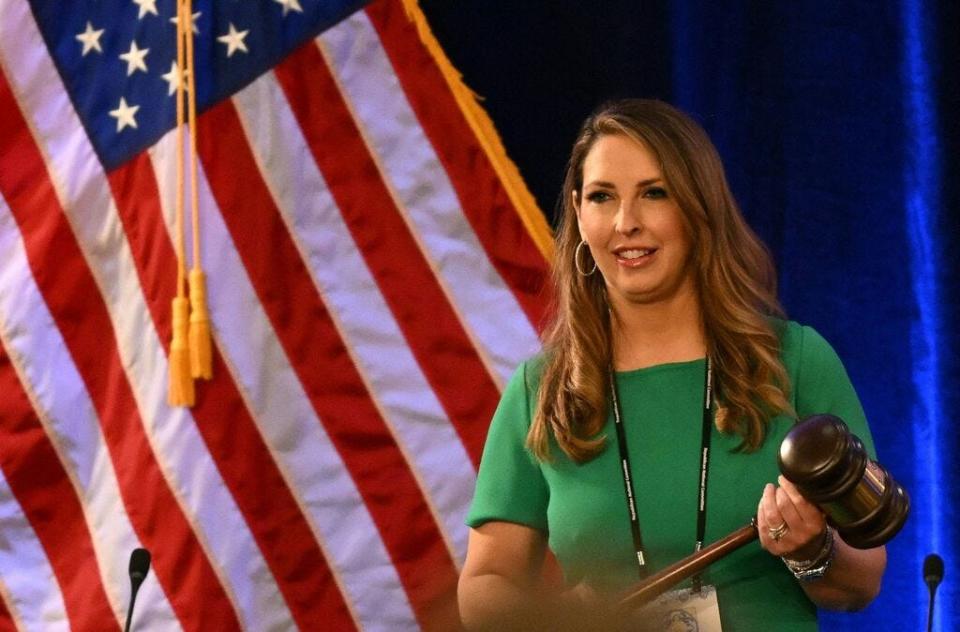
Why making the GOP debate stage is crucial for many candidates
Failing to make the debate stage could be a fatal blow to campaigns, depriving them of necessary exposure.
Some candidates have easily cleared that bar — former president Donald Trump, Florida Gov. Ron DeSantis, former U.N. Ambassador Nikki Haley, U.S. Sen. Tim Scott and entrepreneur Vivek Ramaswamy among them.
Others with immense personal wealth, like Burgum, who is a former software executive, have been able to rely on eyebrow-raising tactics to entice donors.
Pence still has time to meet the criteria. But for now, it has left the former vice president in the unenviable company of candidates such as former Arkansas Gov. Asa Hutchinson, former U.S. Rep. Will Hurd, businessman Ryan Binkley, Miami Mayor Francis Suarez and radio personality Larry Elder — all of whom are still working to qualify for the first debate.
"Every day that goes by we get more and more unique engagement," Pence adviser Devin O'Malley said. "The rate of donations picks up week over week so we’re confident that he’ll be on the debate stage."
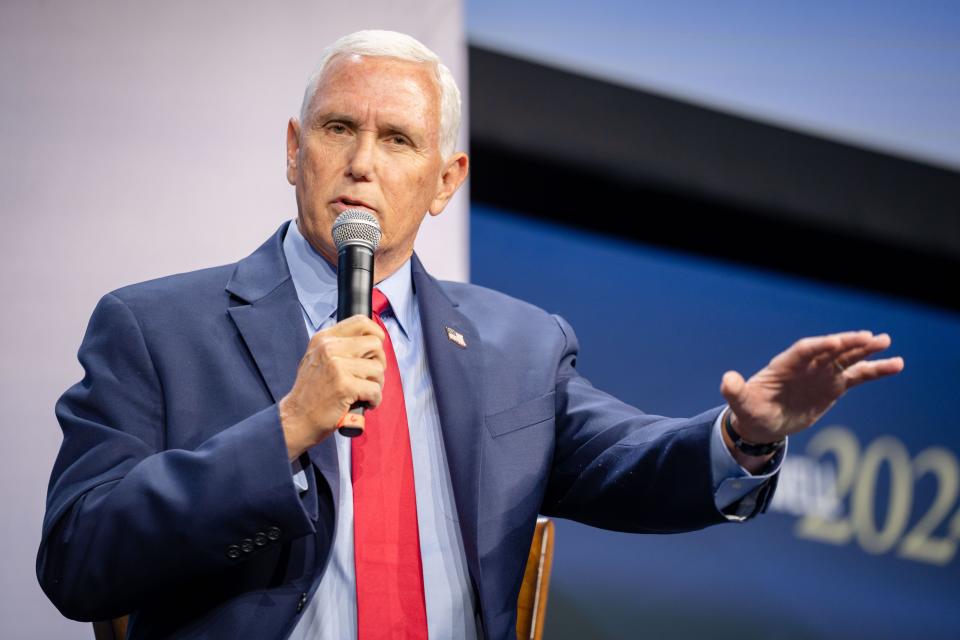
In-person campaigning is down while TV ads are up
According to data compiled and analyzed by the Register, presidential candidates each have announced an average of 19 public campaign events in Iowa between January and the end of July.
That trails the 32 events that candidates were averaging in the first seven months of 2019 ahead of the 2020 Iowa caucuses, as well as the 27 events they were averaging during the same time frame ahead of the state’s 2016 caucuses.
At the same time, television ads — which let campaigns and their affiliated big-money groups promote a message in the candidate’s absence — are way up this year.
According to AdImpact, presidential primary advertising has already hit $32.6 million this year on broadcast and cable networks. That swamps the $4.2 million spent at this point in the 2020 Iowa caucus cycle and the $2 million spent at this point in the 2016 cycle.
While the proliferation of super PACs has helped fuel the rise in TV spending, candidates also are likely to focus more heavily on raising money to qualify for the national debate stage.
“I understand the need to have some thresholds,” Centers said. “But I do think that this is a bit of a steep hill to climb for candidates, and we have to recognize that it is changing the way that candidates approach the campaign trail and how they divvy up their time between fundraising and traditional campaigning.”
Democrats faced a similar hurdle in the leadup to the 2020 Iowa caucuses, forcing some candidates to make difficult choices about how to spend their time.
Although he was well-liked by Iowa Democrats, U.S. Sen. Cory Booker struggled to gain enough traction to meet continually increasing debate criteria that year. He ended his presidential bid two weeks before Caucus Day after failing to get on the January debate stage.
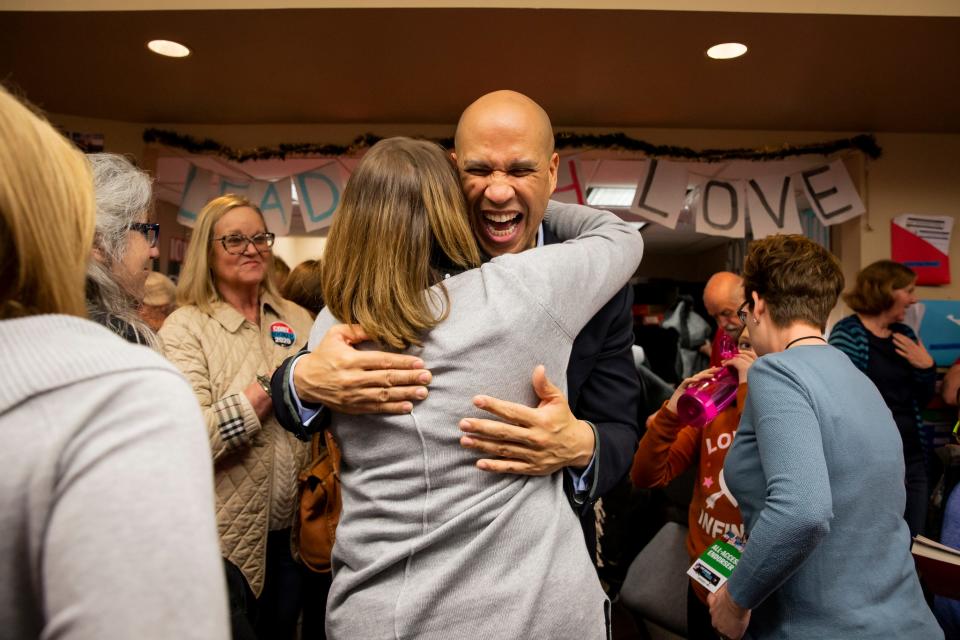
“The two things on a campaign that you never have enough of are time and money,” said Mike Frosolone, Booker’s 2020 Iowa state director. “And these new requirements force you to devote resources that you probably were not planning on (to fundraising).
“Are you going to stay on the East Coast and do some media hits and maybe bring in a couple of thousand new donors? Or are you going to travel to Iowa — go to Mason City and meet 100 people and shake hands? And when you're pressed up against it, you know, ultimately you have to be on the debate stage. So you have to make that choice to skip time in the early states to go up and spend more time with the media and speaking to a broader audience.”
At the first Democratic National Committee presidential debate, held in June 2019, candidates at the time could qualify either by hitting 1% in three separate polls or by tallying enough support among donors.
This year, the RNC is requiring candidates to meet both polling and fundraising thresholds to make it onto July’s debate stage.
Frosolone said it's necessary for the parties to create some kind of criteria dictating who is allowed into the debates. But the danger comes when those hurdles are set too high too soon, he said. The effect is to strip power away from early state voters who have traditionally played the role of vetting candidates and winnowing the field.
“This is certainly the first step for the Republicans, I think, to make a move towards a more nationalized primary,” Frosolone said. “This diminishes the power of the early states, because you have to speak to such a national audience to get all of these donors.”
Hutchinson, the former Arkansas governor, acknowledged the challenge to reporters at U.S. Sen. Joni Ernst's Roast and Ride in June.
“Whenever you look at requirements to get on a debate stage, whenever you put onerous burdens on candidates, you're helping to dictate what they have to do in the campaign and how they need to spend money,” he said. “And so I'm not happy about that. I think it's an unnecessary burden because it's up to Iowa to filter the candidates, not a political party.”
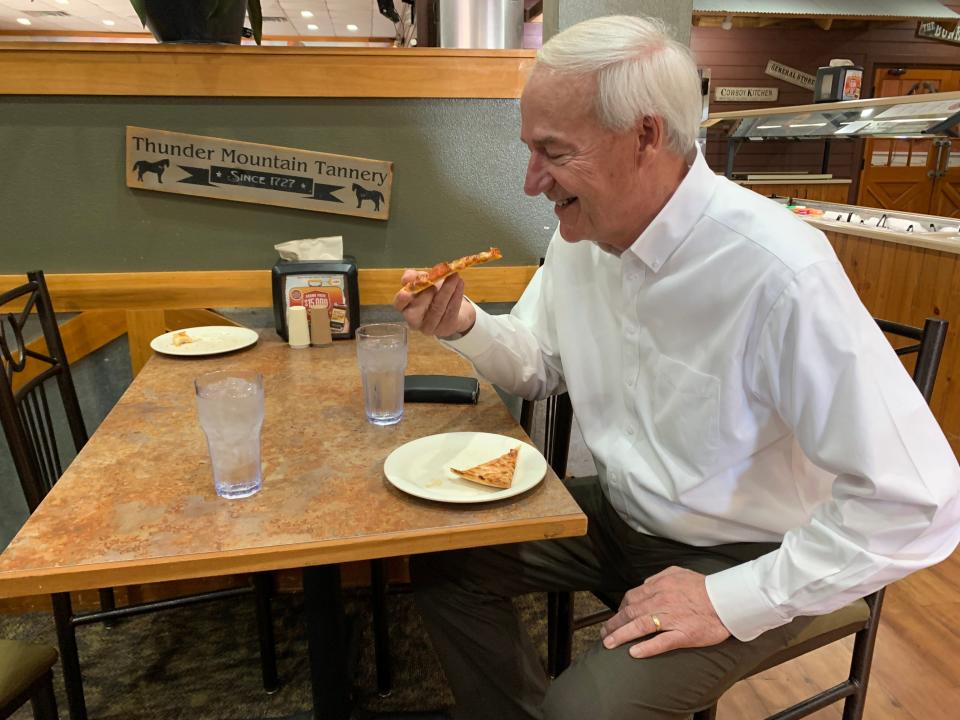
O'Malley, the Pence adviser, said the campaign has begun putting a greater emphasis on inserting the vice president into the news of the day by sending fundraising emails focused on things like the controversy over country musician Jason Aldean’s latest music video or the Sound of Freedom movie.
He said the campaign is also focusing on direct-mail fundraising, which can be time- and resource-intensive.
“I think we’ve yet to really see the full rewards from the direct mail strategy that we have,” he said.
O'Malley dismissed the idea that Pence would spend less time in Iowa in order to raise money.
“I don’t think that we’re ignoring any one tactic in order to fundraise,” he said. “… We raised the amount of money that we need to run the campaign that we are running, which is a lean, nimble campaign.”
Gift cards, T-shirts, concerts: Longshot candidates entice donors with gimmicks
Frosolone said campaigns can easily quantify how much money it takes to raise $1 — “At one point, it was 40 bucks for a $1 contribution on digital,” he said.
So, campaigns with access to that kind of money can funnel it into fundraising if they need to.
“The big guys and the frontrunners don't have to worry about this,” he said. “But if you're somebody whose theory of the case was to go out and do well in the early states and kind of catapult from there, you then have to make a choice: Can you devote resources for TV ads or more organizers down the final stretch? Or does it go to getting on this debate stage. And ultimately, if you're not on the debate stage, you're not making it.”
Perry Johnson, previously an unknown entity in Iowa, announced his presidential ambitions with a bang, airing an expensive Superbowl ad to introduce himself to the state that will have the first say in selecting a Republican presidential nominee early next year.
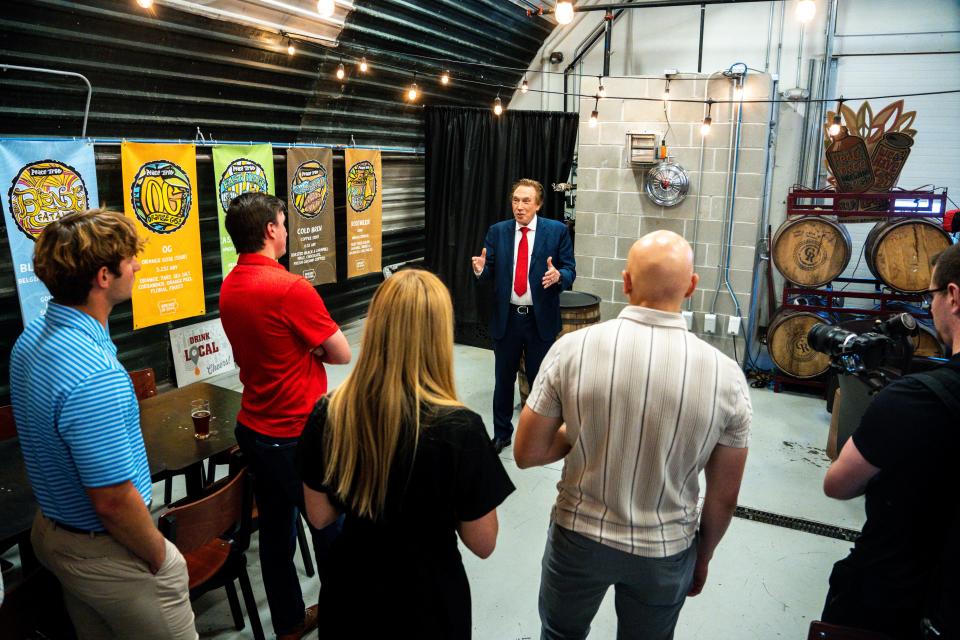
Since formally entering the race, Johnson has produced a reality show for Newsmax giving viewers a behind-the-scenes look at his campaign, and he’s distributed piles of his book, "Two Cents to Save America," across the state.
But nearly all of the splashy spending is the result of Johnson’s own personal wealth rather than a reflection of donor support.
He’s loaned his campaign $8.4 million, according to filings with the Federal Election Commission, and he’s given another $328,000 to the effort outright. Just $67,000 has come from individual donors — including thousands given in increments of $1 or less.
Johnson is among the handful of candidates resorting to gimmicky fundraising efforts to accrue donors — with more emphasis placed on crossing the 40,000-donor benchmark than actually generating money to campaign on.
“I think it's kind of ridiculous if you're willing to fund your own campaign, but you have to go and get donors — they demand that I get 40,000 donors, which is the most absurd thing in the world,” Johnson complained to reporters at U.S. Sen. Joni Ernst’s Roast and Ride fundraiser in June. “If a guy's willing to spend whatever, $1- or $2 million to win an election, you would think he would have a right to at least get on the stage.”
John Yob, a consultant for Johnson’s campaign, said Johnson is holding as many Iowa events as possible and plans to continue increasing them. But he described a Catch-22 situation: Johnson needs national name recognition to get on the debate stage, but without getting on the debate stage he’s struggling to earn national name recognition.
The effort, he said, can de-emphasize their efforts in the early states.
“We just think candidates should be spending time shaking hands and doing the events in Iowa this summer, in New Hampshire this summer, rather than focusing on getting national donors across the country,” Yob said.
Burgum, the North Dakota governor, promised last month that he would give 50,000 people $20 “Biden economic relief cards” if they donated just $1 to his campaign. And on Tuesday, he announced he has met the RNC’s debate criteria after surpassing the donor and polling threshold.
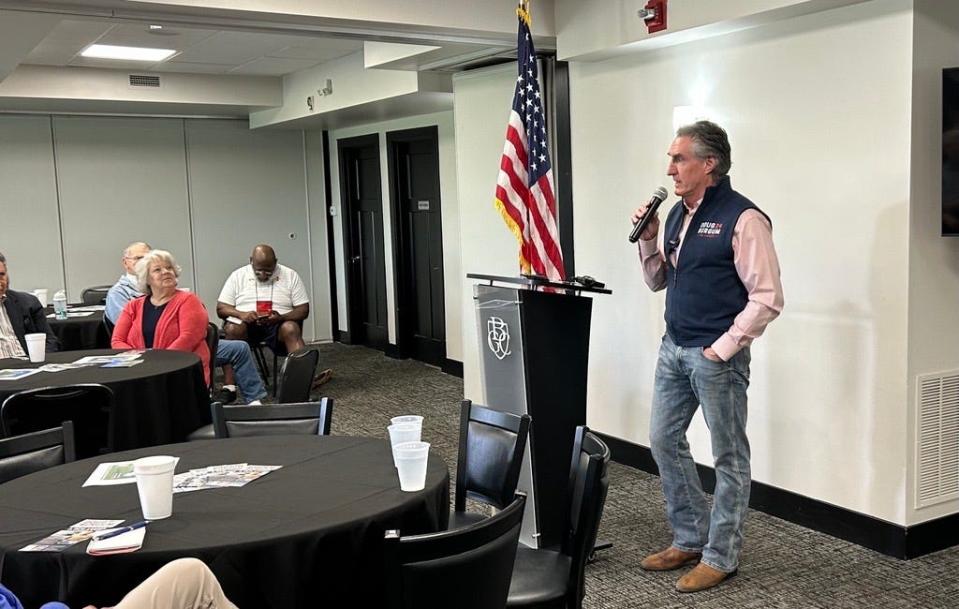
Burgum has also held 11 public announced events in Iowa throughout his campaign, and his press secretary Lance Trover promised he would be campaigning “regularly in the state until the caucuses.”
“Tens of thousands have donated to help Doug get on the debate stage and receive their Bidenflation relief cards,” Trover said. “But we plan to keep going until we reach 50,000.”
Burgum reported raising about $11.7 million in his most recent federal financial report — propped up by a $10.2 million loan he made to the campaign.
Ramaswamy, who is also contributing significantly to his own campaign, has launched the “Vivek Kitchen Cabinet” program, which promises to give participants a 10% cut of whatever they raise for his campaign.
Ramaswamy told reporters at Ernst’s Roast and Ride that he believes the debate requirements are entirely fair.
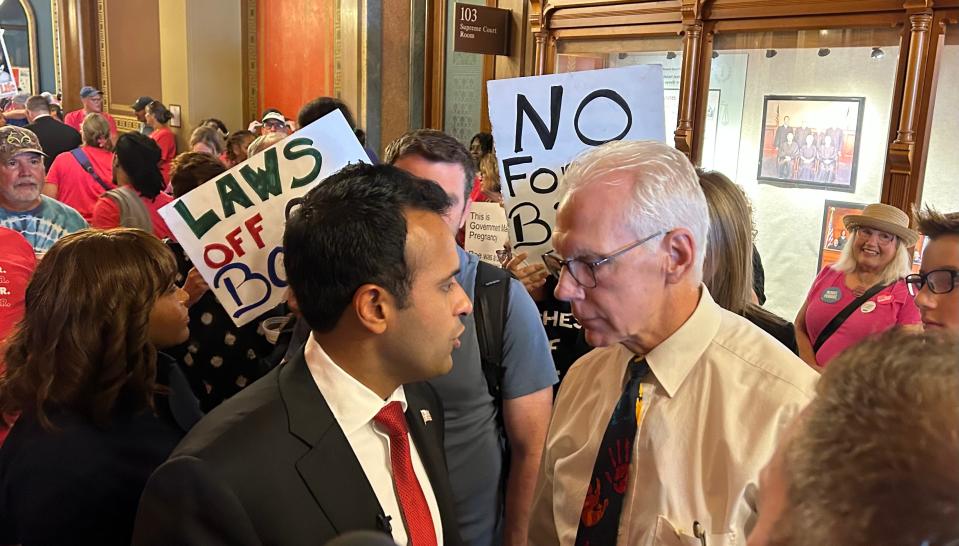
“I've never had a donor in my life,” he said. “I'm a first-time political candidate. So, if I can meet that three months ahead of the deadline, I think that that's perfectly fair criteria.”
Ramaswamy has reported raising more than $19 million, including a $15.3 million loan he made to the campaign as well as $750,000 he made in contributions. He has another $3.2 million in individual contributions.
Other candidates have been critical of some of those efforts.
In a statement, Elder, the conservative radio host, described them as “bribery.”
He said his campaign’s fundraising momentum “continues to grow,” fueled by people who believe in his vision.
“I’m also not throwing ‘free’ country music concerts at a cost of $40,000 to my campaign to entice people to donate a few bucks,” Elder said in the statement. “I’m not running a campaign full of gimmicks. I am running a fiscally responsible campaign.”
Elder has so far reported raising about $453,000, and he has not yet qualified for the debate stage.
'We accept the requirements,’ other candidates say
Other candidates say they have no problem with the debate requirements.
“The RNC has set the standards, and we accept the requirements,” said Diane Moca, a spokesperson for Ryan Binkley’s campaign. “Contemplating the rules only distracts us from reaching our goal. As Republicans, we are laser-focused on the objective at hand, which is giving Ryan the platform to share his message with the largest audience possible.”
Moca said Binkley, a business executive and pastor from Texas, has been campaigning in Iowa extensively.
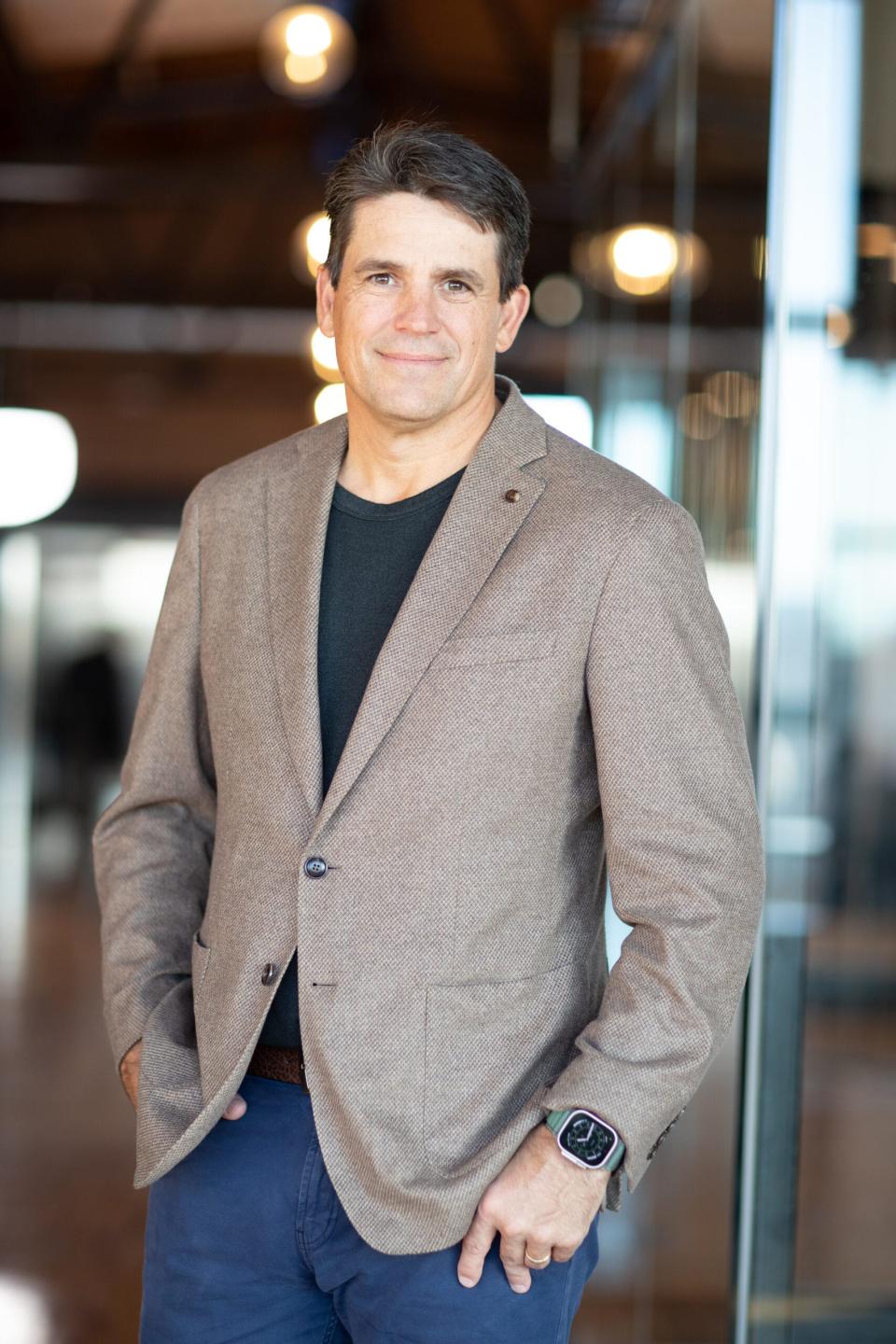
“With every gathering, event and meet and greet, our momentum continues to grow,” she said.
Among the candidates already confirmed for the first debate stage is Haley, who told the Register she plans to stick to more tried-and-true retail politics.
"It’s touch as many hands as you can, answer every question and keep coming back over and over again,” she told the Des Moines Register of her strategy to win over Iowans during a barbecue in Moravia on July 14. “You’ve got to earn every person’s support.”
Scott, the U.S. senator from South Carolina, has also announced meeting the donor and polling thresholds.
Campaign officials said he entered the campaign with the advantage of a large fundraising list as well as a substantial war chest. Scott launched his campaign with $22 million to spend, and he raised an additional $6.1 million in the second quarter.
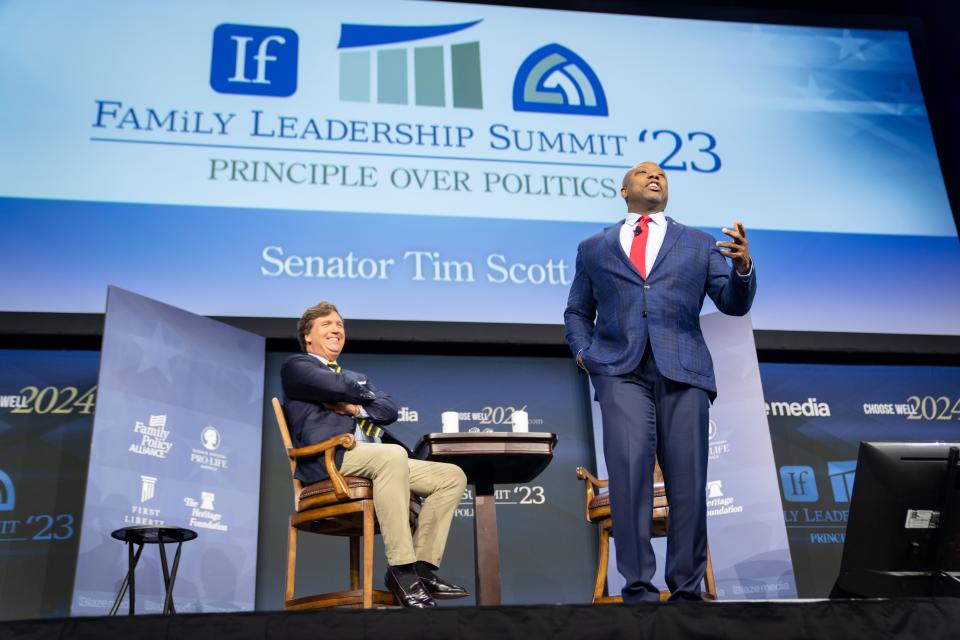
Those advantages mean Scott has not had to resort to any unorthodox tactics to draw in additional donors.
Communications Director Nathan Brand told the Register that the campaign is well-positioned if, as expected, the RNC raises the donor threshold for subsequent debates.
"We are grateful for the growing grassroots support and enthusiasm for Tim Scott,” Brand said in a statement. “His positive, optimistic message anchored in conservatism is resonating with caucus-goers across the state. Tim will be on the debate stage in August and for months to come."
For the frontrunner, the question has not been whether Trump will qualify for the debate stage — it's whether he'll choose to attend.
The former president's campaign operation raised more than $35 million in total between March and June, though more than half of it went to an affiliate PAC that has taken responsibility for Trump's ongoing legal bills. Between that and his significant polling lead, he unquestionably qualifies for the debates — but hasn't committed to appearing.
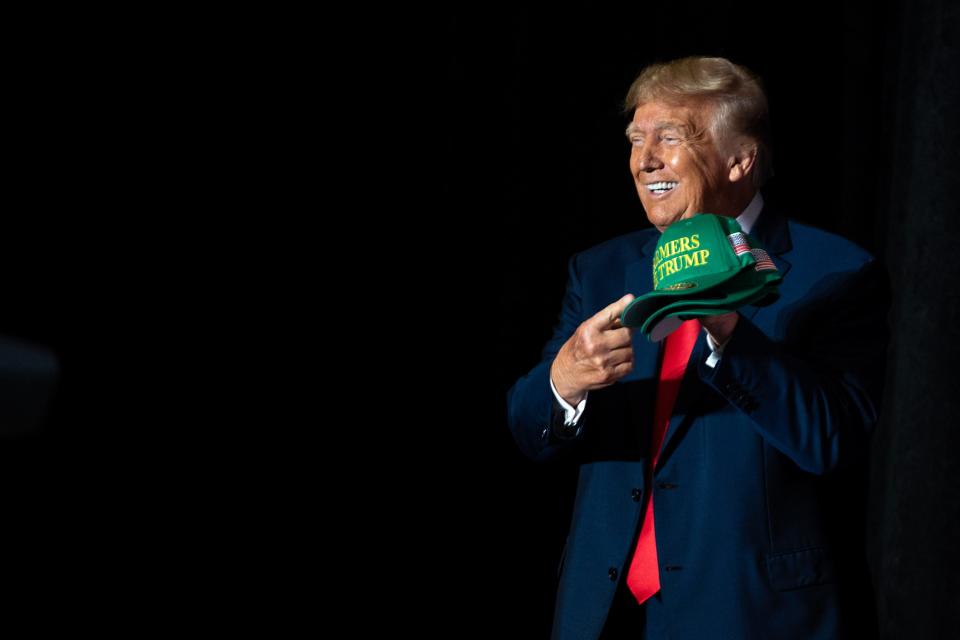
"You're leading people by 50 or 60 points, you say, why would you be doing a debate?" Trump said on Fox News recently.
Trump has so far in the race declined to appear at many events that also feature his challengers, preferring to set his own agenda with separate appearances that often overlap. He will appear on the same stage as DeSantis and much of the field on Friday, at Iowa Republicans' annual Lincoln Dinner.
Des Moines Register reporters Galen Bacharier, Stephen Gruber-Miller, Francesca Block, Amanda Tugade, William Morris, Donnelle Eller and Phillip Sitter contributed reporting.
Brianne Pfannenstiel is the chief politics reporter for the Register. Reach her at bpfann@dmreg.com or 515-284-8244. Follow her on Twitter at @brianneDMR.
This article originally appeared on Des Moines Register: Does the GOP's debate criteria change how candidates campaign in Iowa?

